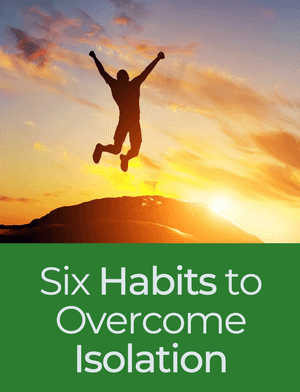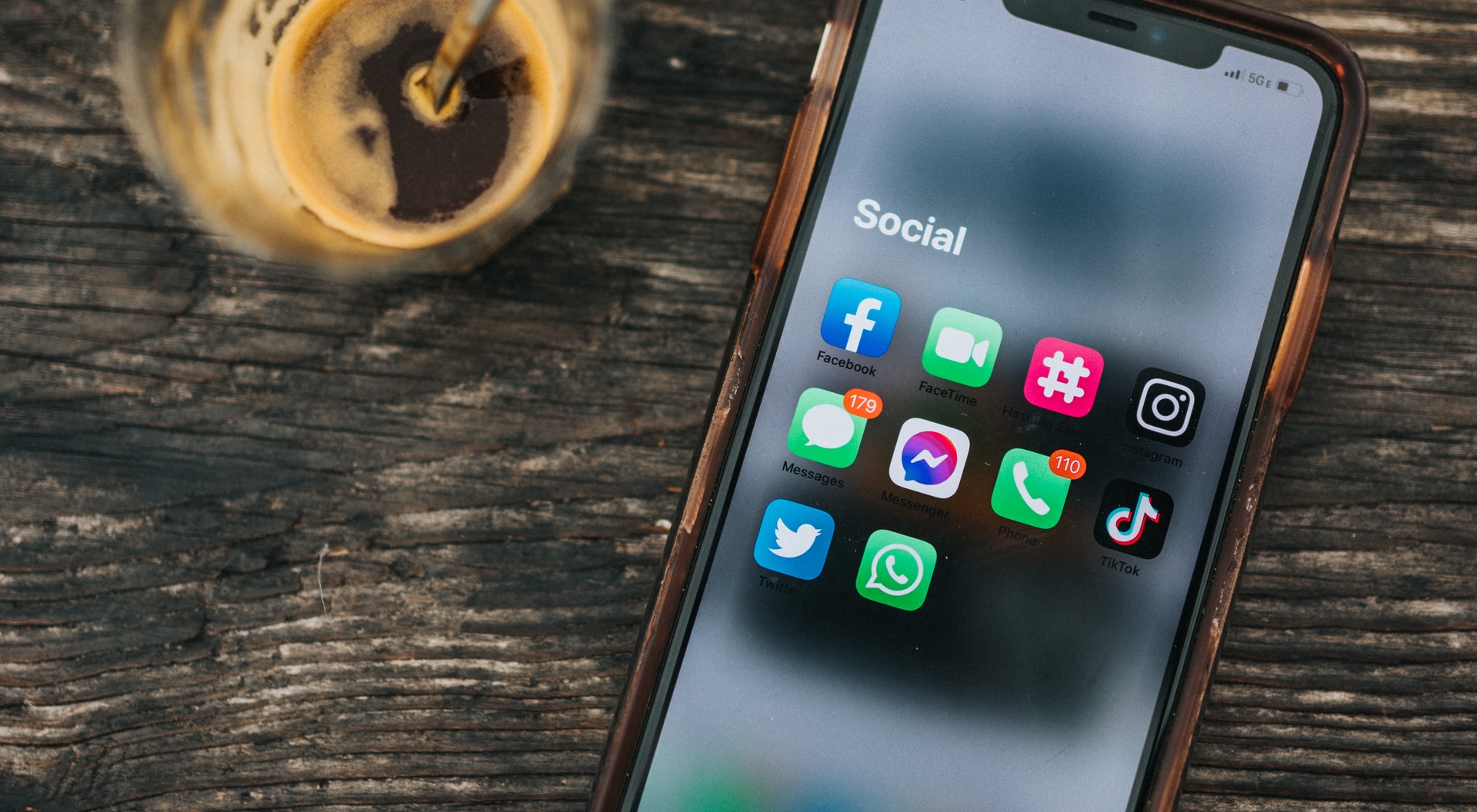
Get the Six Habits for Overcoming Isolation Guide for free


If you've ever felt like you're spending too much time staring at screens and not enough interacting with people in real life, I can tell you that you're not alone. A recent study found that excessive social media use can lead to withdrawal from real-life relationships and as a result, loneliness. It turns out that people who spent more than two hours per day on social media were twice as likely to feel socially isolated than those who only spent 30 minutes per day on the apps.
Listen to the Podcast version here
The Internet is one thing and its opposite. It could remedy the loneliness of many, but it turns out it has multiplied it; the Internet has allowed many to work from home, and that has increased their isolation. And it generates its own remedies to eliminate this isolation, Twitter, Facebook, which end up increasing it."
- Umberto Eco
Whenever I see the word technology, a fascinating book called Unlimited Wealth by Paul Z. Pilzer comes to mind. Paul asserts resources are neither scarce nor finite and that what matters most is not the resources themselves but rather our increasing ability to make more efficient use of them. Most importantly, he argues technology influences both economic supply and demand.
By providing us with new products and processes that change the way in which we live, technology determines what constitutes a need, and hence the nature of consumer demand.
In other words, social media influences your behavior by determining your needs and therefore technology controls the nature of your wants. But is that control over us for the better? If you've read this far, I'm sure you've experienced the feelings of isolation social media can cause. You may have felt like you were missing out or lacking something somehow. It's easy to get lost down the rabbit hole of thumbing through feeds, comparing your authentic life to the seemingly perfect highlight reel of everyone else's. Technology is meant to bring us closer; it is meant to enrich us. Instead, it causes you to lose focus on what's important, and you start feeling alone even when you're surrounded by others.
Studies have shown the more time you spend on your phone, the less enjoyment you derive from real-time conversations. Too much screen time reduces your ability to connect with the few who matter most and leaves you unsatisfied with a craving for intimate connection. Without the proper awareness, your brain triggers the same neural patterns it would under situations of duress. One could argue Big Tech can, and does capitalize on this vulnerability.
Social media can undoubtedly be a good thing, but the reality is that unrestricted usage shatters your focus and distracts you from truly connecting. Here are some strategies I have stumbled upon during my years of research and experimentation, including not having any social media from 2018 through 2021. Try them out and see if they prove helpful to you.
The first step is to become more aware of how you use social media and what effect it has on you. A good way to do this is by keeping a journal. Take note of every time you check social media, how long you spend on it, and how you feel afterward. A lower-effort alternative is to set a daily limit on the amount of time you spend on social media and seeing how you feel at the end of the day. If you fail while trying something, simply get back up and reassess. Each iteration will increase your understanding of how social media influences your behavior.
Write down these habits on a sticky note and place it somewhere easily seen throughout your day. Try to perform them daily.
Where we want to be cautious ... is when the sound of a voice or a cup of coffee with a friend is replaced with 'likes' on a post.
- Brian Primack
Use the focus mode functionality on your phone to limit distractions during periods of high concentration or importance, such as writing code or spending time with loved ones. You can manually toggle focus mode or configure it to turn off and on during predefined hours automatically.
iPhone users, and Android users.
I have a daily routine I refer to as SIGKILL, which starts late in the afternoon and signals the end of the work day. I do yoga, walk my dogs to the park nearby, and check my screen time on my iPhone. This habit is integral to keeping my body and mind balanced by reflecting on how my body feels and how I choose to spend my time.
Allocate a block of time in the evenings to review your screen time. Ask yourself if the time you spent on social media improved the life you will have tomorrow or if it simply passed by and faded out of memory. Again, there is nothing wrong with wanting to stay connected. But I caution you to think about balance.
iPhone users Screen Time
Android users can use Digital Wellbeing
Try to avoid staring at any screens an hour or so before bed as it will interfere with your quality of sleep and thus the amount of energy you have to invest in people the days following. You should also think about not having any screens in your bedroom because, to fall asleep smoothly, your brain must associate the bedroom with sleep alone.
In the later hours of the day, I also like to wear blue-light blocking glasses.
It isn't easy to reach out to others when we need it most. Our entire lives, we have been taught to hide anything that can make others uncomfortable. We have been led to believe our value lies in appearance and possessions. How could you feel safe exposing your genuine emotions when you think doing so will cause others to look down on you and reduce your social status?
The reality is that we all feel lost, scared, or alone at times. Connecting authentically with others is the only way to keep these feelings from becoming chronic. This type of connection requires trust and vulnerability, and trust is built by going through uncomfortable moments together. It's your choice whether to walk the easy road by hiding your true self to appease others or taking the road less traveled by surrounding yourself with people who will happily support you.
I've taken the easy road before, and it led to pain in the long term. I've previously written about how the bugs in my emotional and physical state during my time in the air force caused me to spiral into a depression. At one point, even getting out of bed seemed like an impossible task, no matter how silly that may sound.
Looking back, I realize I felt so heavy because I had no one to talk to. Shame thrives in privacy, and it consumed me alive. One of my few heroes at the time, a kind and caring primary care doctor with fatherly energy, was one of the few people I felt comfortable talking to. I remember sitting across from him in a sterile examination room one day. He asked me if I had ever heard about the story of the purple monkey. I replied I hadn't. What he shared with me led to a profound realization. He said scientists had performed an experiment where they painted a monkey purple and placed him in an enclosure with regular monkeys. Things didn't go well from that point. The regular monkeys tore the purple monkey to shreds.
It's an interesting thought experiment. The environment I was in at the time rightfully demanded I exude a specific image. This is how a proper military organization functions, its parts operate to benefit the system or the mission, not the individual. The doctor was trying to tell me that the isolation I experienced was due to my inability to fit in. He didn't ask me to change who I was or hide my true nature; he suggested I fly under the radar so the load would be lessened.
I learned from that experience that having shallow relationships is equal to, if not worse than, being socially isolated. Authentic connections are required to maintain a positive outlook on life. Relying on image to please others didn't make me happy, nor did hiding parts of myself to avoid homophobia and maintain shallow relationships. What truly brought change into my life was putting social media on the back burner and investing in relationships, so I can rely on them when I need them in the future. I could lose my house, investments, career, and dignity, but I feel safe knowing I could start over because I have people to fall back on.
If sharing emotions with friends makes you uncomfortable, ask yourself what it would be like if the situation were reversed. If you had an opportunity to make a friend feel heard and worthy - would you take it?
http://paulzanepilzer.com/uwsoundviewp1-htm
https://en.wikipedia.org/wiki/Paul_Zane_Pilzer#Government_service
https://www.goodreads.com/book/show/52627417-screened-in
https://www.scripps.org/news_items/6310-8-tips-to-reduce-screen-time-for-adults
https://support.apple.com/guide/iphone/view-your-screen-time-summary-iph24dcd4fb8/ios
https://support.google.com/android/answer/9346420?hl=en
https://www.amazon.com/gp/product/B07K3FTJJH/
https://support.apple.com/en-us/HT212608 https://blog.google/products/android/android-focus-mode/

Get the Six Habits for Overcoming Isolation Guide for free